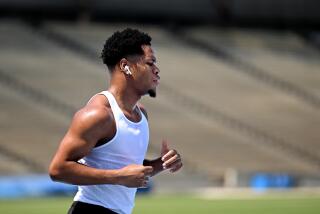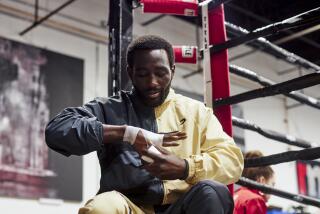He Is Still His State’s Only Hill : Boxing: The undefeated light-heavyweight champion again returns to Bismarck, N.D., to fight Tyrone Frazier.
- Share via
BISMARCK, N.D. — In the biggest arena in North Dakota, the state’s biggest sports star since Roger Maris will perform before the home folks again today.
And in what might be his final appearance in medium-money fights--and perhaps his final Bismarck bout--before stepping up to boxing’s upper-end income brackets, Virgil Hill will defend his World Boxing Assn. light-heavyweight championship against Philadelphian Tyrone Frazier.
For Hill, the most successful pro of the 1984 U.S. amateur class at the Los Angeles Olympic Games, it will be the ninth defense of the championship he took from Leslie Stewart in 1987--and his eighth in Bismarck.
Hill, 26, is 27-0. Frazier, 28, is 17-1-3. Hill will earn $300,000 today, but bigger paydays await.
Hill and his manager, Gary Martinson, have been avidly following the negotiations between representatives of Sugar Ray Leonard and Tommy Hearns. The latest reports are that there will not be a Leonard-Hearns III. Not this year, anyway. That would be fine with Martinson and Hill, who think Hearns-Hill is a much better idea.
A few months ago, it looked as if Hill was on his way to the Middle East to fight Prince Charles Williams in Bahrain. But Williams, the International Boxing Federation champion, signed to fight Detroit’s Michael Moorer later this summer.
Then the World Boxing Council champion, Australian Jeff Harding, signed to fight Dennis Andries of England in Melbourne July 28.
All of this apparently leaves Hearns, a super-middleweight and still one of boxing’s major draws, with only one probable opponent: Hill.
“Our goal is still to unify the light-heavyweight division,” Martinson said.
Hearns, who represents a payday of more than $1 million for Hill, represents one-third of Hill’s perfect world, according to Martinson.
“We want Tommy next, then the Moorer-Williams winner, then the Andries-Harding winner,” Martinson said.
“That would give Virgil the opportunity for a nice payday against Hearns, then a shot at unifying the light-heavyweight championship.”
Actually, Virgil Hill’s perfect world is already in place--the state of North Dakota. Nearly 30 years after Maris knocked Babe Ruth out of the record book, the state finally has another star athlete.
This afternoon, in a town of 45,000 on the Missouri River in south-central North Dakota, a crowd of about 7,000 is expected at the Bismarck Civic Center to watch what one expert rates as North Dakota’s No. 2 man on the state’s most famous athletes list (No. 3 is former New York Knick Phil Jackson).
“It’s still hard to believe . . . that in North Dakota we actually have a world boxing champion,” said Abe Winter, longtime sportswriter for the Bismarck Tribune.
The population of North Dakota is about 650,000, less than San Jose. And when Hill fights in Bismarck, all roads lead to the state capital. They come from Zap, Nome, Max, Munich, Donnybrook, Berlin and Flasher. Sometimes, the governor is at ringside. For Hill’s fight here last year against Bobby Czyz, two farmers arrived in a crop-duster.
However, you are reminded by the cowboy-boot set that Hill hasn’t yet topped Brad Gjermundson of Marshall, N.D., who was a four-time pro rodeo world saddle bronc riding champion. And in a state where ice hockey is much bigger than boxing, who can forget that Cliff Purper of Grand Forks was the first North Dakotan to reach the National Hockey League?
After Purper, however, the list softens a bit. Quickly, you get down to Verne Booth of Velva, 12th in the 10,000-meter run at the 1920 Olympics; or to Casper Oimoen, captain of the 1932 U.S. Olympic ski team.
What Hill has achieved, no one here would have predicted, not even when Hill was a football/boxing star at Williston, in the state’s northwest corner.
Hill’s father, Bob, a plumber, moved his family from Grand Forks, on the state’s eastern side, to Williston midway through his son’s high school years to take advantage of Williston’s strong amateur boxing program.
Hill began winning regional amateur trophies and, it seems, has been an overachiever ever since. When he made the 1984 Olympic team at middleweight by beating Michael Nunn, many called him the weakest link of the 12-member team.
But Hill, who was one of three members of the ’84 U.S. team who did not win a gold medal (he won a silver), has been more successful as a professional than any of his Los Angeles teammates. Others, such as Evander Holyfield and Mark Breland, have made more money. But none has defended a championship so many times.
It started in 1984, when Hill ran around the ring in the Los Angeles Sports Arena waving a small North Dakota flag on worldwide TV. And during a TV interview, he shouted: “I love you, North Dakota!”
Several months ago, Hill was scheduled to fight Frazier at Caesars Palace. But he suffered a broken thumb in training, and the fight was rescheduled for Bismarck.
“There were about 200 Bismarck people going to that fight, and they were really disappointed,” said Betty Klein, president of the Virgil Hill Fan Club. Klein signs up members at $15 apiece and distributes the money to North Dakota charities.
Some facts and figures about the club’s hero:
--Hill was the grand marshal of the Mandan, N.D., Fourth of July parade.
--When Hill fights, the Bismarck Tribune builds entire sections around the boxer. Pizza parlors, western wear stores and auto body shops all sign up for the obligatory ad: “Good Luck, Virgil!” Thirteen North Dakota newspapers will staff the Hill-Frazier bout today.
--When Hill upset Stewart and won the title in Atlantic City, N.J., only one North Dakotan made the trip. Bismarck’s then-mayor, Marlan Haakenson, who doesn’t like planes, drove the 1,700 miles to the East Coast. He was introduced before the fight as “the mayor of North Dakota.”
--After Hill won the championship, he was awarded the state’s highest sports honor, the Theodore Roosevelt Rough Rider Award, and his portrait was placed in the lobby of the state capitol in Bismarck.
--The night before Hill’s 1988 fight against Jean-Marie Emebe in Bismarck, 3,000 showed up for a “Virgil Hill Pep Rally.” The highlight was when Mark Grothier, known as “The Dakota Rambler,” sang his composition, “The Ballad of Virgil Hill.”
There doesn’t seem to be a bit of phoniness to any of this. Here are his roots, his heritage, he likes to say, and here is his future.
“I live in Arizona because it’s where I like to train for fights, and I’m investing in real estate there,” Hill said. “But there’ll be the day, when boxing is over over for me, when I’ll come back to North Dakota.
“Right now, in fact, I’m thinking about buying a farm property somewhere in the state. It’s a good feeling, to know that if I were to ever experience misfortune in my life, I’ve got all kinds of friends in North Dakota.
“And the best thing about it is, these people don’t care if I win, lose or draw. They just like me, and that really feels good.”
If Virgilmania becomes any more intense here, it could get scary. In the 1870s, Bismarck was called Edwinton. Then a rumor got out that Germany’s Prince Otto von Bismarck was shopping for an American railroad. Moving quickly, the city fathers adopted the name Bismarck, hoping to catch his eye. It didn’t work.
Think about it: Virgil, N.D.?
More to Read
Go beyond the scoreboard
Get the latest on L.A.'s teams in the daily Sports Report newsletter.
You may occasionally receive promotional content from the Los Angeles Times.










